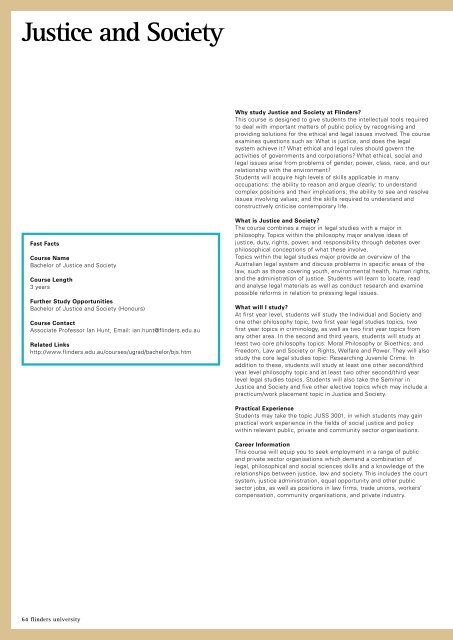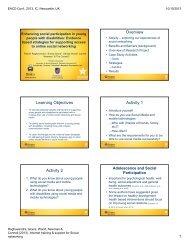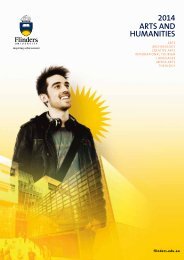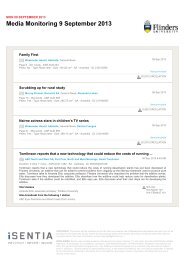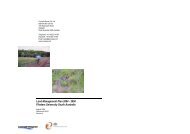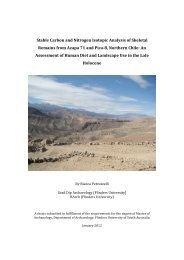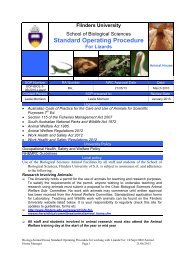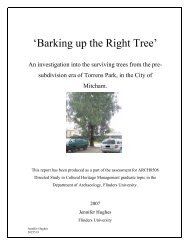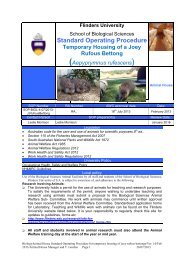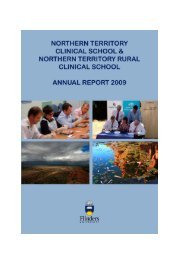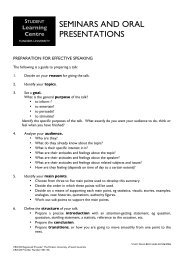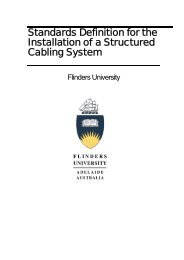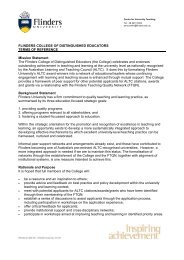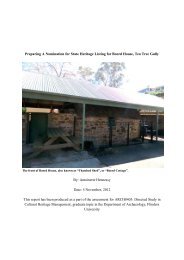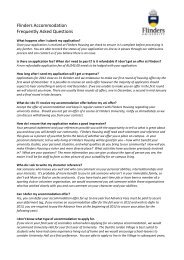Undergraduate - Flinders University
Undergraduate - Flinders University
Undergraduate - Flinders University
Create successful ePaper yourself
Turn your PDF publications into a flip-book with our unique Google optimized e-Paper software.
Justice and Society<br />
Fast Facts<br />
Course Name<br />
Bachelor of Justice and Society<br />
Course Length<br />
3 years<br />
Further Study Opportunities<br />
Bachelor of Justice and Society (Honours)<br />
Course Contact<br />
associate Professor Ian Hunt, email: ian.hunt@flinders.edu.au<br />
Related Links<br />
http://www.flinders.edu.au/courses/ugrad/bachelor/bjs.htm<br />
64 flinders university<br />
Why study Justice and Society at <strong>Flinders</strong>?<br />
this course is designed to give students the intellectual tools required<br />
to deal with important matters of public policy by recognising and<br />
providing solutions for the ethical and legal issues involved. the course<br />
examines questions such as: What is justice, and does the legal<br />
system achieve it? What ethical and legal rules should govern the<br />
activities of governments and corporations? What ethical, social and<br />
legal issues arise from problems of gender, power, class, race, and our<br />
relationship with the environment?<br />
Students will acquire high levels of skills applicable in many<br />
occupations: the ability to reason and argue clearly; to understand<br />
complex positions and their implications; the ability to see and resolve<br />
issues involving values; and the skills required to understand and<br />
constructively criticise contemporary life.<br />
What is Justice and Society?<br />
the course combines a major in legal studies with a major in<br />
philosophy. topics within the philosophy major analyse ideas of<br />
justice, duty, rights, power, and responsibility through debates over<br />
philosophical conceptions of what these involve.<br />
topics within the legal studies major provide an overview of the<br />
australian legal system and discuss problems in specific areas of the<br />
law, such as those covering youth, environmental health, human rights,<br />
and the administration of justice. Students will learn to locate, read<br />
and analyse legal materials as well as conduct research and examine<br />
possible reforms in relation to pressing legal issues.<br />
What will I study?<br />
at first year level, students will study the Individual and Society and<br />
one other philosophy topic, two first year legal studies topics, two<br />
first year topics in criminology, as well as two first year topics from<br />
any other area. In the second and third years, students will study at<br />
least two core philosophy topics: Moral Philosophy or Bioethics; and<br />
Freedom, Law and Society or rights, Welfare and Power. they will also<br />
study the core legal studies topic: researching Juvenile Crime. In<br />
addition to these, students will study at least one other second/third<br />
year level philosophy topic and at least two other second/third year<br />
level legal studies topics. Students will also take the Seminar in<br />
Justice and Society and five other elective topics which may include a<br />
practicum/work placement topic in Justice and Society.<br />
Practical Experience<br />
Students may take the topic JuSS 3001, in which students may gain<br />
practical work experience in the fields of social justice and policy<br />
within relevant public, private and community sector organisations.<br />
Career Information<br />
this course will equip you to seek employment in a range of public<br />
and private sector organisations which demand a combination of<br />
legal, philosophical and social sciences skills and a knowledge of the<br />
relationships between justice, law and society. this includes the court<br />
system, justice administration, equal opportunity and other public<br />
sector jobs, as well as positions in law firms, trade unions, workers’<br />
compensation, community organisations, and private industry.<br />
Why study Language at <strong>Flinders</strong>?<br />
<strong>Flinders</strong> offers all students the opportunity to major in a language in<br />
conjunction with any undergraduate course. they complete a total of<br />
one extra year of study and graduate with both their chosen degree<br />
and a diploma in Language.<br />
the following languages are available:<br />
• French<br />
• Italian<br />
• Modern Greek<br />
• Spanish (through the Department of Languages)<br />
• Indonesian (through the <strong>Flinders</strong> Asia Centre).<br />
What will I study?<br />
the course involves studying a major sequence in a language over at<br />
least three years and must, therefore, be studied concurrently with<br />
the main degree. Language studies cannot be confined solely to the<br />
additional year. this requires some adjustment to the normal pattern<br />
of the main degree and academic counselling is available to help you<br />
structure your studies.<br />
the diploma can be started in the first or second year and need not be<br />
completed in consecutive years. For example, your degree structure<br />
may make it more appropriate to undertake language studies in the<br />
first, second and fourth years of your program.<br />
Practical Experience<br />
<strong>Flinders</strong> also encourages students to study their chosen language<br />
overseas, in countries where that language is spoken. If you choose<br />
to take approved language studies overseas you can, on successful<br />
completion of these studies, transfer the credit gained to your <strong>Flinders</strong><br />
degrees. Please note that international students cannot study in their<br />
home country.<br />
Career Information<br />
It is designed to provide students with competence in a chosen<br />
language and thus add greater portability to their qualifications. at<br />
the same time, it increases cross-cultural understanding and provides<br />
the academic rigour of formal language study. By adding linguistic<br />
expertise or strengthening skills already gained in a language other<br />
than english, students increase their ability to communicate the skills<br />
and interests from their main study area to the wider community.<br />
Fast Facts<br />
Course Name<br />
diploma of Language<br />
Course Length<br />
1 year (in conjunction with a bachelor degree)<br />
Language<br />
Course Contact<br />
Ms Kate Wiseman, email: kate.wiseman@flinders.edu.au<br />
Related Links<br />
http://www.flinders.edu.au/courses/ugrad/diplomas/dl.htm<br />
inspiring achievement 65


